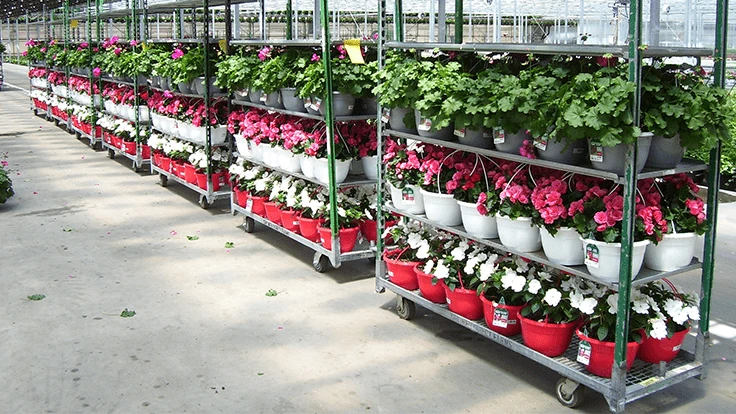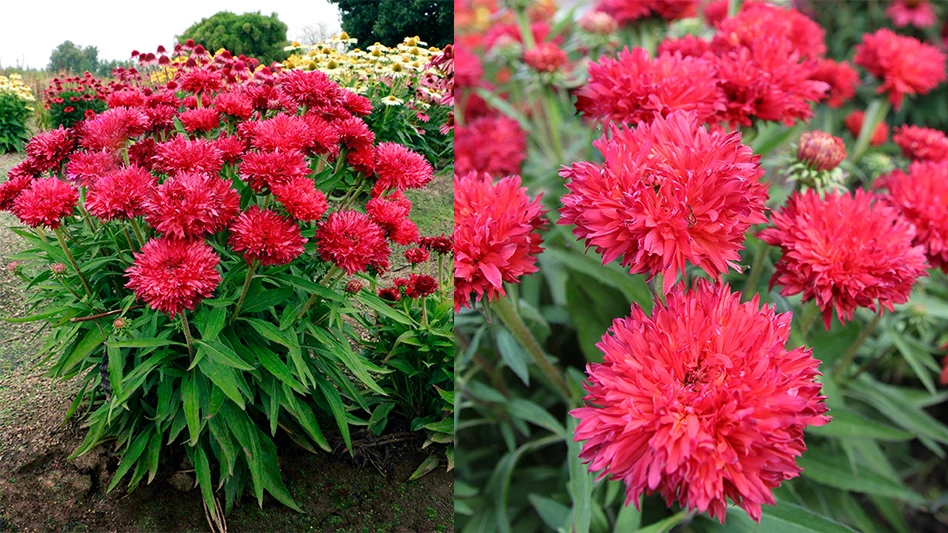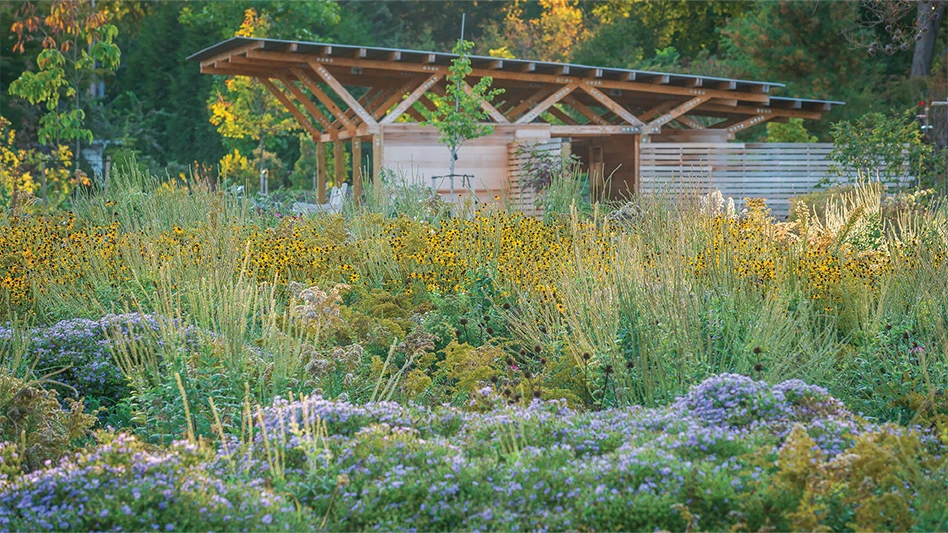

Carts are now the standard plant handling device for many growers. They have proven to be efficient, versitile and require very little maintenance. They are available to meet almost all of growers’ needs from transportation, shipping, displaying and customer service. And they can handle almost any material — bulk, bags, flats, pots or nursery stock.
All greenhouse operations can benefit from carts. The savings in labor makes the payback very short. Each time a flat is handled by a worker, at least 3 cents is added to its cost. One to three handlings can be eliminated by loading the plants in the greenhouse, rolling or fork-lifting carts onto a truck and unloading and pushing the carts into the garden center. A typical multi-shelf cart holds 40 to 60 flats.
Keep them on level ground
Ramps with a slope no greater than 1:12 should be installed between greenhouses or work areas that are at different levels. And keep in mind that, the larger the wheel diameter, the easier it is to move a cart. It takes about 20 pounds of force to push a 1,000 pound cart on a concrete or asphalt surface and about 40 pounds on hard-packed gravel.
Transport carts should be designed with flexibility in shelf spacing. Shelves should be easy to add or remove to accommodate different sized plants. Some manufacturers offer folding or knock-down carts to save on back-haul space. In some, the shelves are removed and stacked onto one cart and the bases stacked onto another. In others, the shelves are removed and the rack folded to a narrow width. A 22” wide cart is convenient as it holds the standard flat and fits into narrow aisles in the greenhouse.
The easiest way to load a cart onto a truck is from a loading dock. The height needs to be compatable with the height of the truck body. Another convenient method is to install a hydraulic tailgate so that the carts can be loaded from an outside growing area or unloaded at a garden center that doesn’t have a dock.
Carts vary in price from $200 to about $500 for one that holds 50 flats. Extra shelves are $40 - $50. Used carts are available from some suppliers. Cart leasing is popular in some areas.
To prevent the loss of carts sent to garden centers, they should be color coded or have a laser-cut name tag. Some growers are now using bar coding or RFID (radio frequency identification) tracking that can identified and track down the location of the cart.

Racks are a lower-cost alternative to carts.
Racks can be made from steel or wood. Most of them utilize a standard wood pallet as a base with vertical angle iron corner posts and brackets for adjustable shelves. Adequate diagonal bracing is needed. Plywood is the common shelf material.
If your delivery area is nearby, racks are usually left at the garden center until the next delivery. For delivery to more distant locations, some growers use disposable wooden racks.
Racks also save the number of handlings if they can be loaded next to the growing area. They are usually transported and loaded with a forklift or fork truck.

To prevent loss, carts and racks should be color coded, have a laser-cut name tag or feature RFID barcodes.
Storage considerations
An area is needed to store carts and racks to keep them out of the weather. A hoophouse is used by some growers. It should be leveled and have a smooth, well drained floor and easy access. Loading time depends on the distance between storage and truck. The experience of the operator also affects loading time with some carriers. Based on a study I did for the Horticultural Research Institute a few years ago, the average time to pickup and load a cart is about 25 seconds plus travel distance at 2 feet/sec. Average. time to pickup and load a rack is about 50 seconds. plus travel distance at 2 feet/sec.
Carts make a great low-cost tool to reduce the labor and cost of plant handling. Their flexibility and long life can help all size growing operations.

Explore the February 2021 Issue
Check out more from this issue and find your next story to read.
Latest from Greenhouse Management
- Grant awarded to test western U.S. wood species for use as wood fiber potting substrate
- Pennsylvania Horticultural Society announces 2025 Gold Medal Plant winners
- Oasis Grower Solutions announces new Southeast territory sales manager
- A nation of gardeners: A history of the British horticulture industry
- Last Word with Angela Labrum, Bailey Nurseries
- Iowa plant supplier Plantpeddler building retail complex
- This month's Greenhouse Management magazine is about native plants and sustainability
- The HC Companies, Classic Home & Garden merge as Growscape





